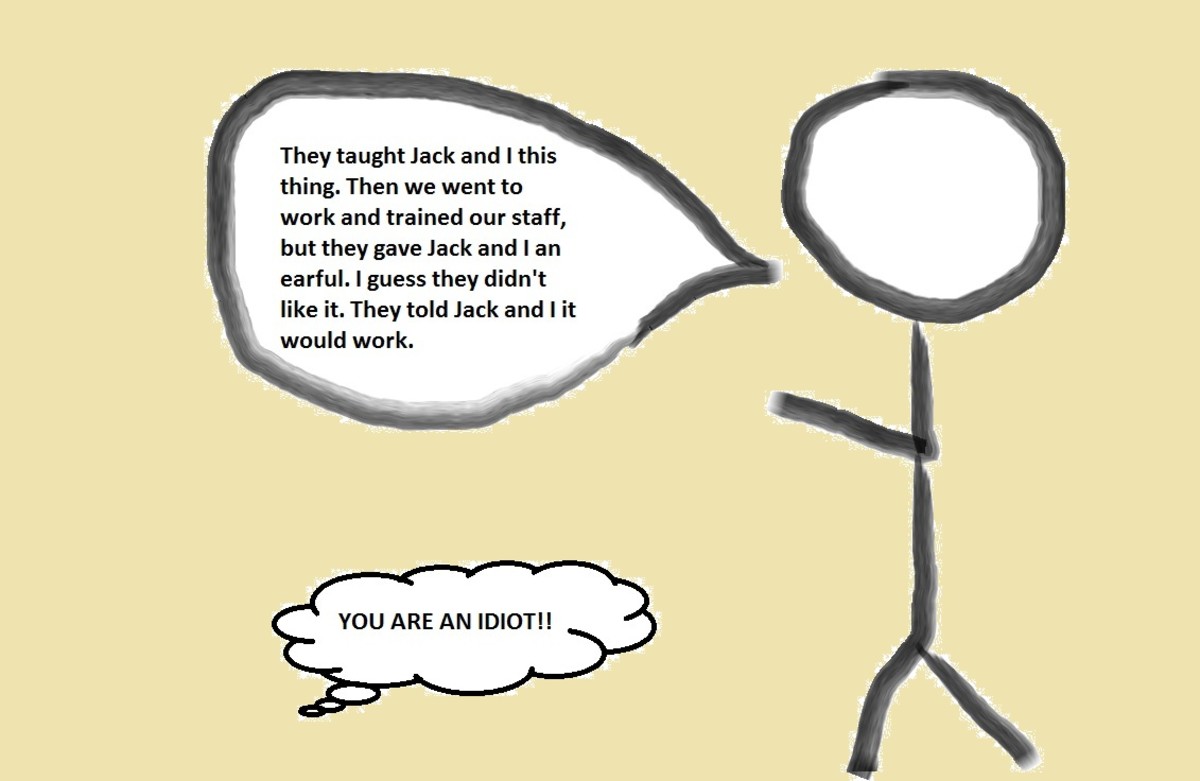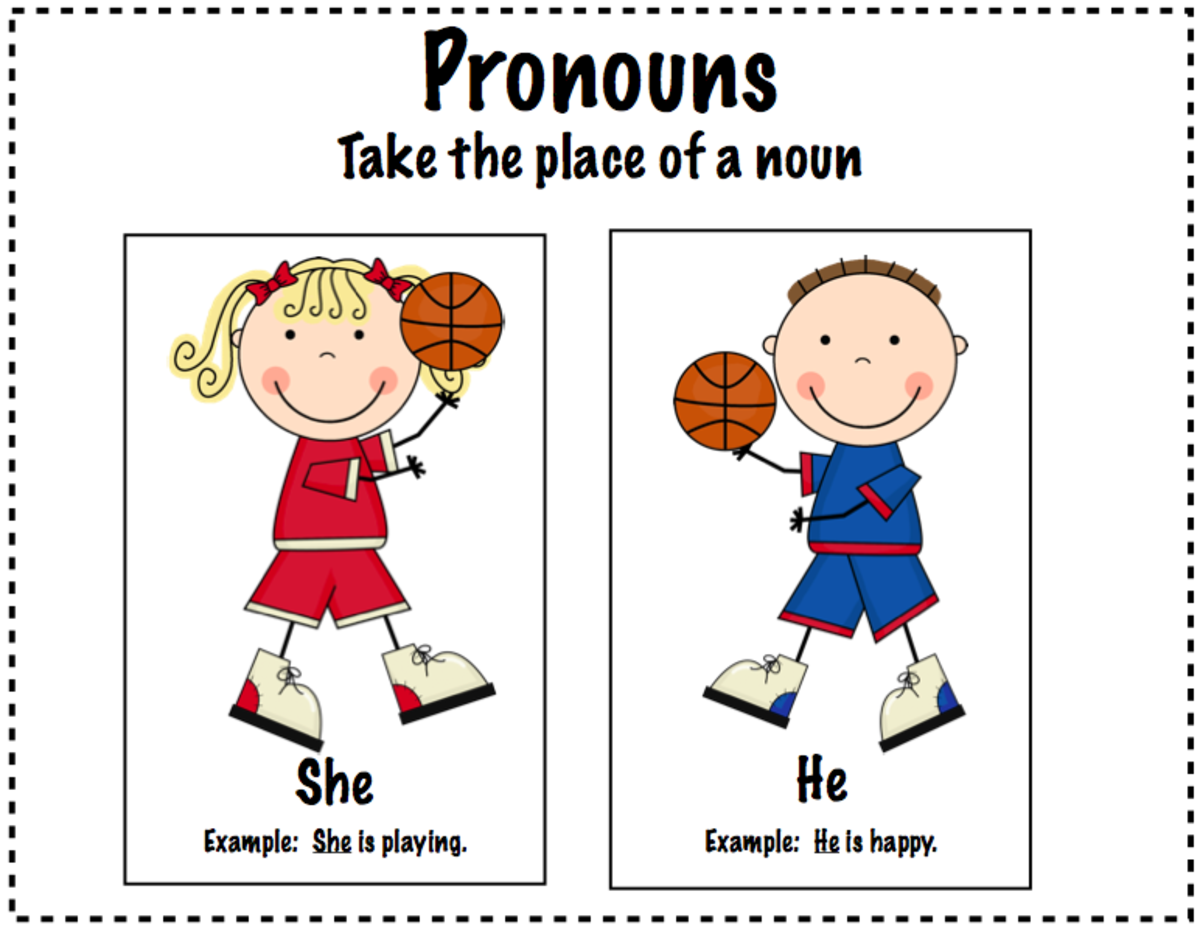The English Language: Using Pronouns Efficiently
Pronouns
Pronouns make the day simpler for every writer and speaker.
A pronoun is a special noun which takes an assumed meaning based on the placement in the paragraph. Without pronouns, sentences could look something like this:
- Bob owns a car. Bob washes Bob's car every day to keep it clean.
Instead of using "Bob" and "car" redundantly, we can use pronouns to simplify the sentence as follows:
- Bob owns a car. He washes it every day to keep it clean.
Above,
we replaced "Bob" with "He", and "car" with "it". However, the second
sentence only makes sense in reference to the first.
- He washes it every day to keep it clean.
The above sentence yields questions like "Who washes what every day to keep it clean?".
Be very careful to have defined your pronouns in a previous sentence.
Varieties of Pronouns
- Personal: (Subjective, Objective, Possessive)
- Interrogative
- Reflexive
- Intensive
- Demonstrative
- Indefinite
- Relative

Personal Subjective Pronouns Chart
X
| Singular
| Plural
|
|---|---|---|
First Person
| I
| We
|
Second Person
| You
| You
|
Third Person
| He, She, It
| They
|
Personal Subjective Pronouns
The pronouns above take the place of the subject of the sentence.
- I never dance on an empty stomach.
- Don't you like cheeseburgers?
- He doesn't like being in the center of attention.
- Everything changed when we bought our new house.
- (To a group of people:) Do you want free ice cream?!
- I called Microsoft Support last night, but they haven't called back.
Personal Objective Pronouns Chart
X
| Singular
| Plural
|
|---|---|---|
First Person
| Me
| Us
|
Second Person
| You
| You
|
Third Person
| Her, Him, It
| Them
|
Personal Objective Pronouns
The pronouns above take the place of the object of a verb1, preposition2, or infinitive phrase3.
- Sesame Place gave1me six free tickets!
- Will you let Sadie dance with2you at the party?
- He doesn't like to sing3.
- Our vacation was the best thing for1us.
- (To a group of people) As the United States Government, we are responsible for making the best decision for2you and your best interest.
- You don't have to tell3them, you know.
Personal Possessive Pronouns Chart
X
| Singular
| Plural
|
|---|---|---|
First Person
| Mine
| Ours
|
Second Person
| Yours
| -
|
Third Person
| His, Hers, Its
| Theirs
|
Personal Possessive Pronouns
The pronouns above serve to reference the owner of a particular object or person.
- That cake is mine.
- Isn't that phone yours?
- Brianna is his fiancée.
- That car is ours.
- That chess set is theirs.
Make note that these pronouns do not change from singular to plural based on the object that is owned, but, rather, the number of people/things owning the referent.

Interrogative Pronouns Chart
No Suffix
| With Suffix
|
|---|---|
Who
| Whoever
|
Whom
| Whomever
|
Which
| Whichever
|
What
| Whatever
|
Interrogative Pronouns
The eight interrogative pronouns above are used to ask questions. "Who", "whom" and "which" may be used to refer to people, whereas "which" and "what" are used to refer to objects/plants/animals. "Who" refers to the subject of a verb, whereas "whom" refers to the object of a verb.
- Who gave you a hard time earlier?
- To whom did you bring the cake?
- Which sport did you eventually play?
- What is SEPTA's phone number?
- Whoever invented air conditioning should be proud.
- The prize goes to whomever can answer the next question correctly.
- Whichever color of paint you choose, we'll use it to paint the room.
- Whatever option you decide to go with is fine with me.

Reflexive Pronouns Chart
X
| Singular
| Plural
|
|---|---|---|
First Person
| Myself
| Ourselves
|
Second Person
| Yourself
| Yourselves
|
Third Person
| Himself, Herself, Itself
| Themselves
|
Reflexive Pronouns
The above pronouns reflect back on the person or object to which they refer. Note that "Ourself", "Themself", "Theirselves" and "Theirself" are not listed. "Ourself" is attempting to use a plural pronoun as a singular pronoun, which is, of course, in correct. The same is true for the other three iterations.
- I typically try to keep myself out of other people's business.
- I'm doing well. Yourself?
- He gets himself into so much trouble these days.
- As members of the Royal Shakespeare Academy, we must make sure that we represent ourselves as a true Shakespearean thespian.
- As for you, would you please keep yourselves out of trouble?
- Oh, they keep to themselves, mostly.

Intensive Pronouns Chart
X
| Singular
| Plural
|
|---|---|---|
First Person
| Myself
| Ourselves
|
Second Person
| Yourself
| Yourselves
|
Third Person
| Himself, Herself, Itself
| Themselves
|
Intensive Pronouns
Intensive pronouns exist for the purpose of intensifying, or emphasizing, the person or object to which they refer.
- I, myself, prefer country music to rap music.
- Even Elvis, himself, couldn't have pulled off that move.
- We, ourselves, have no right interfering in that matter.

Demonstrative Pronouns Chart
X
| Singular
| Plural
|
|---|---|---|
First Person
| This
| These
|
Second Person
| -
| -
|
Third Person
| That
| Those
|
Demonstrative Pronouns
The pronouns above serve to demonstrate the location, within time or space, of a noun. The first-person pronouns in this set refer to things nearby in time or space, whereas the third-person pronouns in this set refer to things farther away in time or space.
- This cake is mine.
- That car is ours.
- These movie tickets are for you.
- Aren't those the keys you were looking for earlier?

Indefinite Pronouns Chart
Singular
| Singular/Plural
| Plural
|
|---|---|---|
Another
| All
| Both
|
Anybody
| Any
| Few
|
Anyone
| More
| Fewer
|
Anything
| Most
| Many
|
Each
| None
| Others
|
Either
| Some
| Several
|
Enough
| Such
| They
|
Everybody
| ||
Everyone
| ||
Everything
| ||
Less
| ||
Little
| ||
Much
| ||
Neither
| ||
No one
| ||
Nobody
| ||
Nothing
| ||
One
| ||
Other
| ||
Plenty
| ||
Somebody
| ||
Someone
| ||
Something
| ||
You
|
Indefinite Pronouns
Above is a list of indefinite pronouns. The above list is, by no means, comprehensive, but is fairly complete. These pronouns take the place of an identifiable but non-specific entity.
Singular
- One quantum bit, or "qubit", has the capability of occupying several states at the same time.
- Much was discovered at the recent dig site.
- After we discussed the situation, either option would be acceptable.
Singular/Plural
- All is lost
- All are accounted for
- Such is the way the world works.
- For of such are the Kingdom of Heaven.
Plural
- Both cheeses are extremely pungent.
- Several days ago, the plane crashed on the island.
- Few of them survived.

Relative Pronouns Chart
No Suffix
| With Suffix
|
|---|---|
Who
| Whoever
|
Whom
| Whomever
|
That
| -
|
What
| -
|
-
| Whichever
|
Relative Pronouns
The above pronouns can be used connect one phrase to another phrase.
- The winner is the first person who makes it across the finish line.
- Chances are that the dances are those for whom the cake was bought.
- Oblivion is a video game that ranks very highly on Direct2Drive's website.
- The verb describes what the subject of the sentence is doing.
- The President of the United States may decide that whoever was in the previous cabinet should stay on.
- The President of the United States may freely choose whomever he pleases for the new cabinet.
- Of the games several outcomes, whichever is chosen yields a victory.









